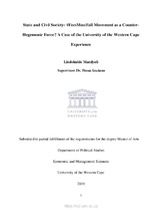State and civil society: #FeesMustFall movement as a counter- hegemonic force? A case of the University of the Western Cape experience
Abstract
The #FeesMustFall (#FMF) movement is an important moment in South Africa as it provides
insight into the evolution of the relations between state and civil society. An inquiry into the
2015/2016 student protests at the University of the Western Cape (UWC) shows the contradictions
that persist in South African society twenty years after apartheid. The study examines the reaction
of the state to the dissent embodied by #FMF demands. Drawing on Gramsci and Althusser the
study develops a framework against which #FMF is assessed, in order to test whether the
movement was counter-hegemonic, if so, to what extent. The assessment is done using a qualitative
approach to the research; i.e. auto-ethnography, which relies on the experiences of the author, as a
tool of data collection. The selection of this technique is informed by the proximity of the author
to the protests, and scarcity of prior research done on the UWC #FMF case. Also, the study uses
primary data such as media statements, media articles, YouTube videos, speeches, interviews and
personal communications as a means to triangulate the auto-ethnographic data.
The data gives insight into the origins of the movement at UWC, the motivations of, and the tactics
employed by the leaders. The movement at UWC shuts down the campus, blocks national roads,
marches to the airport and even disrupts exams in attempts to see its mission through; a mission of
Fee Free Education. Finally, drawing on the framework from Gramsci and Althusser this study
notes the persistence of contradictions such as access to higher education in democratic South
Africa. It shows the battle for hegemony between the state and civil society and identifies the
dominance of the state, and how it deals with those who challenge it. To this end, #FMF does
embody some counter-hegemonic quality. However, the study also reveals how #FMF carries out
its actions in the boundaries of hegemonic institutions such as the constitution and the university.
Hence, the extent of #FMF’s counter-hegemony went as far as affecting the operations of the
university and not the structure thereof. As such, #FMF, like other radical civil society agents of
its kind, is an example of issue based and temporary counter-hegemony. Although significant, it
is not necessarily that which would see the complete overthrow of the university, or the state for
that matter.

